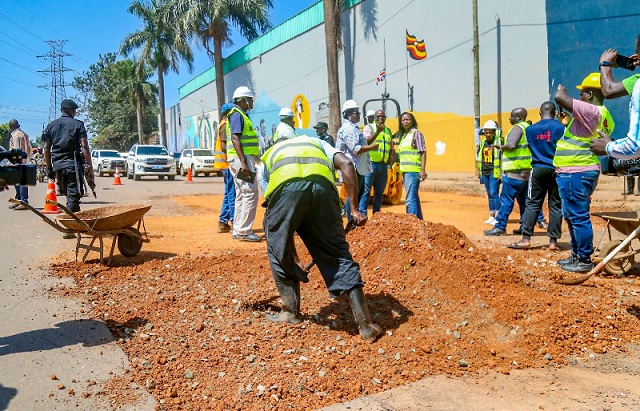
The African Development Bank has mobilised $275 million for the project, with the Global Environment Facility and the government jointly contributing $5 million
Kampala, Uganda | THE INDEPENDENT | The implementation of the 69.2 km Kampala City Roads Rehabilitation Project (KCRRP) continues to gain momentum, with current progress standing at 28.4% across all project components.
The initiative, aimed at modernizing Kampala’s road infrastructure, is set to benefit approximately 1.6 million people, including commuters, business owners, and transport providers, by reducing congestion, enhancing traffic flow, and improving the city’s drainage systems to address flooding.
Led by the African Development Bank (AfDB), the project has secured $275 million in funding, with additional contributions of $5 million from the Global Environment Facility and the Ugandan government.
Initially scheduled for completion in December 2024, the project’s deadline has been extended to December 31, 2027, allowing for the successful realization of all planned developments. The Kampala Capital City Authority (KCCA) is responsible for executing the project.
Kampala, Uganda’s administrative and commercial hub, faces severe infrastructure challenges, exacerbated by rapid urbanization and climate change. Only 30% of the city’s 2,110 km road network is paved, with frequent flooding and traffic congestion disrupting daily life. The KCRRP aims to address these issues by upgrading the road network, improving key traffic junctions, and constructing 5 kilometers of drainage structures to better manage storm water. Additionally, over 10,000 trees will be planted along major roads to reduce carbon emissions, improve air quality, and mitigate noise pollution.
During a recent inspection of the project, Prof. Anthony Nyong, Director of Climate Change and Green Growth at the African Development Bank, commended the initiative, stating, “The African Development Bank is proud to be associated with this project, which is not only improving infrastructure but also mainstreaming climate resilience measures to ensure long-term sustainability. The incorporation of environmental measures such as tree planting and eco-friendly public transport highlights the project’s commitment to climate adaptation.”
Prof. Nyong’s visit was accompanied by other key officials from the AfDB, including Dr. Olufunso Somorin, Regional Principal Climate Change Officer, and Muthoni Nduhiu, Climate Change Expert, along with Engineer Justus Akankwasa, Director of Engineering and Technical Services at KCCA.
Akankwasa emphasized the importance of sustainable development in Kampala, stating, “Kampala, as a city built on seven hills, faces unique climate challenges, particularly flooding. Through innovative design and engineering, we are integrating resilience into our infrastructure systems to ensure they can withstand the effects of climate change.”
In addition to easing traffic and reducing flooding, the KCRRP will introduce scheduled eco-bus transit services, pedestrian and bicycle paths to offer alternative modes of transportation, thus contributing to better air quality and environmental sustainability.
Looking ahead, the African Development Bank is exploring further support through its Urban Municipality Development Fund (UMDF) to conduct feasibility studies on road infrastructure improvements.
Prof. Nyong also highlighted an upcoming call for proposals by the Africa Climate Change Fund, which could help KCCA enhance its solid waste management systems, further bolstering the city’s climate resilience efforts.
Launched in 2019, the Kampala City Roads Rehabilitation Project marks a significant step towards modernizing Uganda’s capital city, promoting economic growth, and addressing the pressing impacts of climate change.
 The Independent Uganda: You get the Truth we Pay the Price
The Independent Uganda: You get the Truth we Pay the Price





